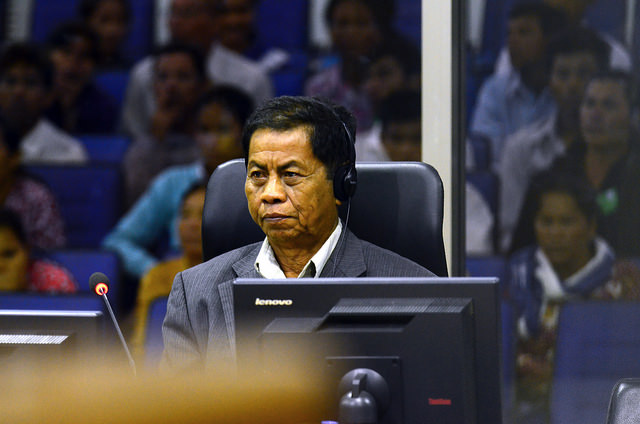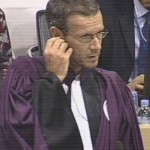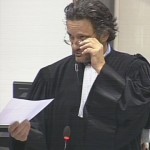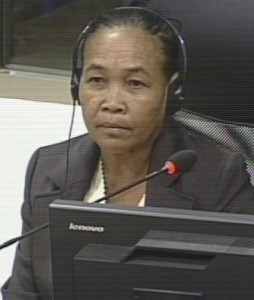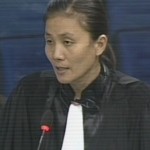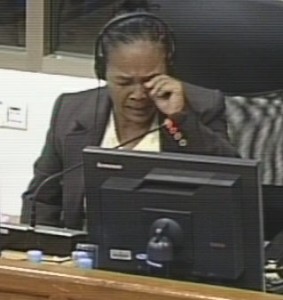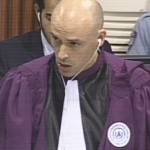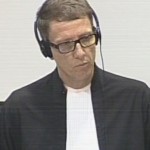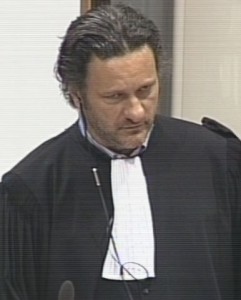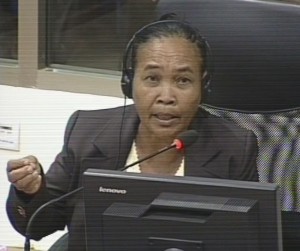“I was forced to work as an animal” – Civil Party who joined the Khmer Rouge when she was 13 tells the Court
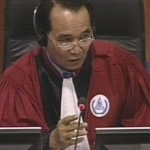
Acting president of the court for today, Judge Ya Sokhan
Today, on June 24, the court finished the examination of witness Mr. Him Han and started hearing the testimony of civil party Ms. Chum Samoeun.
The acting president of the court Judge Nil Nonn was absent for personal reasons and Judge Ya Sokhan replaced him. Judge Sokhan will also replace Judge Nonn tomorrow, the last day before the summer recess. (The Supreme Court Chamber will convene on July 2nd , though, to hear three defense witnesses on case 002/01).
—
Mr. Victor Koppe, defense counsel for Nuon Chea, started off the cross-examination of witness Mr. Him Han.
Rank
The first questions were related to his positions within Division 310. Mr. Han confirmed that he had been a commander in 310 and a secretary of biographies and also a staff officer in regiment 12. Mr. Han clarified though, that he had no leading role in regiment 112. He said he acted as a spokesperson for the commander of regiment 12. Mr. Koppe asks if his position allowed him to have a good overview and Mr. Han said yes but insisted that he could not give orders.
Mr. Han confirms that he understood his unit was considered traitorous but that he “didn’t know anything about the traitorous activity.” He only heard about it after he was sent to Kampong Chhnang Airfield.
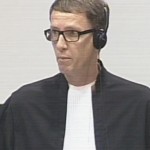
Mr. Victor Koppe, defense counsel for Nuon Chea (All subsequent pictures courtesy of Kim Sovanndany from DC-Cam)
Mr. Koppe confronts him with the testimony of Mr. Hoeun from the day before about the alleged plot: the plan to attack the radio station and Pochentong Airport, and asks if it refreshes his memory,
Mr. Hoeun says that he did not know anything about the “traitorous activities”.
“I did not receive any plan regarding that activity. Only after I was assigned to work at the KC airport did I hear about the uprising, I did not hear about it before.”
Mr. Koppe then reads from two statements, given to DC-Cam, that talked about the plot from other soldiers in Division 310.
The first statement that Mr. Koppe read, from a person that he didn’t name because it might be a potential witness, said the following:
“Yes [the plot] erupted in late 1976… We were going to erupt, but we were exposed…. Two divisions in the north zone were ready to fight. The east zone was also ready to fight … [but] Kun the chairman of the North zone was arrested.”
The second statement that he read was also from a statement to DC-Cam. This person was also a soldier in Division 310:
“Ta Oeun planned an attack plot. Unfortunately, when the plan was compromised we were transferred to farm rice. First he called us for a secret meeting and told us that he planned to attack Phnom Penh. . . Only 100 combatants including me were called to attend this meeting. . . I took a full truck of weapons to meet him in Phnom Penh. . . Unfortunately the plot was compromised.”
“Why did he plan to attack Pol Pot?” the DC-Cam interviewer asked.
“He said that society was not good,” responded this soldier.
“Did you think that his force could not defeat Pol Pot?”
“It was not easy… We would appeal to Vietnam and to the forces from the east,” the soldier said, “that was what Ta Oeun told us . . . Ta Oeun was in charge of forces in Phnom Penh.”
“Did you think that Ta Oeun’s forces would defeat Pol Pot?”
“I thought so because Pol Pot’s forces were disarmed and the guns were stored in the warehouse,“ the soldier responded.
Koppe asks, now that he’s read three testimonies, whether that refreshes his memory.
Mr. de Wilde objects on the ground that the “witness was very clear that he does not recall anything. I do not think that it is appropriate to ask him if it would refresh his memory,” said Mr. de Wilde, “ it is not possible that what you’re saying would refresh his memory.” Mr. de Wilde also says that it might be useful to read the names and positions and ages of the persons he was quoting from.
Mr. Koppe goes back and forth with the judges and the prosecution until he says:
“I’m tired of this, I will ask the question differently,” Koppe says.
“Are you now aware of the plot to stage a coup?”
The witness says, “I was not aware. “
Change of name
The witness Mr. Han explains that he changed his named to Ream when he arrived at the Kampong Chhnang Airfield (KC) because he realized that the people from the south west zone who took over were illiterate and could not find out.
Method of execution: rock breaking
Mr. Han said that assigning workers to rock breaking was a method of execution. He said only workers from the East Zone would be assigned.
“It was a method of execution,” Mr. Han explained, “because the explosives were used to break the rock, and the one who was tasked with placing the explosives would be injured or die. I did not witness this, I only heard about it. “
—
Mr. Arthur Vercken, Co-Lawyer for Khieu Samphan, took the floor and asked why had joined the Khmer Rouge.
Mr. Han explained that his house was destroyed because of the aerial bombings of the Lon Nol regime. He also explained that the Lon Nol forces came into the villages and had no morals because they would steal livestock, chicken and ducks.
Working conditions at KC Airfield
Mr. Vercken confronted Mr. Han with a testimony from another person who allegedly was in the same unit (17) as Mr. Han who had said that :
“Our work was less harsh but we did not eat enough. We would eat two cans of rice per day… the portions were measured for each person.”
Mr. Han responded:
“The statement that was given by this witness is hardly correct. Regarding my unit.. we did not have enough to eat and the work was so hard. . . If this witness was with me in the worksite he wasn’t in the same unit.”
Listening to the Radio
It seemed that Mr. Han could listen to the radio at nighttime with one or two workers. It was not clear whether this was at the KC airfield or before.
“Yes. I could listen to the radio but not in public,” Mr. Han said, “when I was on guard at night time I could listen with a low voice, but we could not turn on the radio loudly in the group.”
Tempering yourself?
Mr. Vercken asked whether there were any re-education session. Mr. Han responded that he did not attend any meetings of the kind.
Mr. Vercken then asked:
“Can we conclude from what your saying that you were supposed to temper yourself without any assistance from the outside?”
“I acknowledge the issue of tempering,” Mr. Han said “Regarding the nature of the work that I did, it was really labor intensive and I have told you repeatedly on the work that I did: digging the ground, uprooting and carrying rock and I had to work day and night. When ever the bell rang I had to be ready to go to work. Even when it was raining I had to go to work . . There was no questions asked . . .we simply did what we were asked to do. And sometimes at night we had to work up to four hours.”
Mr. Kong Sam Onn, Co-Lawyer for Khieu Samphan, asked a few questions and the court adjourned for lunch.
—-
After lunch, the Trial Chamber started hearing the testimony of civil party Ms. Chum Samoeun. She was born on the 4th of march of 1960 in Prech Chhouk village, Chhouk Commune, Kampot Province. Her father’s name is Chum Chean her mother’s Pov Uorn. Her husband is Rith Chrak and she has five children.
The Court only gave one session for both the civil party lawyers and the prosecution combined
Ms. Moch Sovannary, Civil Party Co-Lawyer, started the examination.
Ms. Samoeun said that in 1973, when she was 13 years old, she joined the Khmer Rouge army, in Division 11, which was stationed in Trapeang Phlearng in Chhouk district. She joined because she wanted to liberate King Sihanouk. Kaeo Sangon was the commander of Division 11. She didn’t know which zone Division 11 belonged to.
She was asked to carry rice to one village close to Tuol Krasiang, which was in the rear battlefield. She said that people from the front battlefield would come and eat the rice.
She said that in her group, she had ten colleagues, who had the same age as her (13).
When Phnom Pneh was liberated her division was moved to do rice farming in Wat Kdal next to Stoeung Meanchey Keo, far from the glass-making factory.
After Wat Kdal she moved to do rice farming at the factory and later on she was assigned to make fertilizer. Then she was moved to O Bae-K’orm. At that time, division 11 was combined with division 502. Ms. Samoeun recalled that the commander of 502 was Met.
At one point, she was told by her chief that she had been linked to the former regime because her father had been a soldier. Her biography was found out and she was put in an unit composed of people who were accused of being affiliated with the former regime. (She would later clarify that it was because her father was a policeman in the Lon Nol regime and her stepfather was a soldier in the Lon Nol regime.)
When she was assigned to this new unit, she was ordered to carry earth for ten days and she worked alone. (At this point, she started crying and wiping her eyes) “I did that work according to their assignment, I did not know if I did the work correctly,” she said.
The President , since she is crying, asks the court officer to bring tissues to the civil party.
Her civil party application said that “from mid 1976 you were relocated to work at Kampong Chhnang Airfield (KC).” Ms. Samoeun explained that she did not know then why she had to go. She was just told that she had to do. She said that her whole unit went.
She says she was too young at the time to remember how many months she spent there, maybe 2 or 3 months, she said. She remembers that she arrived at KC Airfield at nighttime. The next day she saw that canals had already been dug. Sroeun, her unit chief, told her that that place was KC Airfield. Her chief didn’t tell her why she was there.
She had to carry soil and rocks and compact the soil. She said they worked in three sessions: morning, afternoon, and night. There was no breakfast, she said. For lunch they were given rice and corn, which was not sufficient at all, she said. As for the soup, she “never saw any fish in it.”
She said that the food ration for her 11-person group was two cans of rice and ten cans of corn per day.
She said that she was never allowed to stop working.
Forced marriage
In late 1978 she was forced to get married in a five-couple ceremony. She did not know the prospective man at all. She sat on one side and the men sat on the side. They were asked to hold hands and read a promise and then returned to her quarters with their spouses.
She said that she refused at first and that they threatened her by saying that if she refused she would never date anyone and that if she smiled at a man she would be killed.
They were asked to go to a room and her body was trembling. She asked the man not to do anything to her and the man did not do anything to her.
She is not living with the husband today. She said that three days after the marriage, they were separated.
Mr. Joseph Andrew Boyle, Assistant Prosecutor, then took the floor and stayed on the topic of marriages.
In your supplemental info, you said: “After eating,… well armed informers came to check whether we were getting along with each other. … even after marriage we did not have sexual intercourse but we kept it a secret.… when the regime ended we did not live together..”
She explained that militia came to eavesdrop. She didn’t know if they were armed as she only heard their footsteps. The militia wanted to know if they had consummated the marriage.
“Why did you keep it a secret?” Mr. Boyle asked.
“Because my father and stepfather were former servants of the Lon Nol regime. . .” She said she did not know what would happen if they found out that she had not consummated the marriage. “
Met (head of division 502) arranged the marriage for her and then he was also present at the marriage.
Mr. Boyle ended his examination by asking if she felt like a prisoner when her biography was taken and she was accused to have “bad tendencies.” Ms. Samoeun said: “Yes.” She then confirmed that she was still considered a prisoner when she was sent to the KC Airfield.
__
Mr. Victor Koppe, defense counsel for Nuon Chea, questioned various statements from her civil party application and read them out to her. Ms Samoeun denied having made such statements.
Ms. Samouen denied having made the following statements that Koppe read form her civil party application:
- -“In December 1978, sadly by two older brothers and my younger brother were killed by comrade Pet, in Kampot province with the allegation that they were enemy agents.“ Ms. Samouen said she did not give such a statement and that her elder brothers were not killed by Pet.
- – “Prior to 1975, I was a medic under Sou Met stationed at Pochentong Airport.” Ms. Samouen said she was never a medic.
- – “In early 1976 I was ordered to investigate the backgrounds of all the soldiers in my unit.” Ms. Samouen said that she never gave such a statement. She said it was she herself who was investigated.
Mr. Koppe at one point asks who was the person who interviewed her. Ms. Samoeun does not remember the interviewer’s name.
Normal duties as a soldier
Mr. Koppe then gets the civil party to state that she had been sent to the Kampong Chhnang Airport (KC) as part of her normal duties as a soldier.
“Were you sent to KC because of your connections with the former regime?” he asks.
“I did not know that I was sent to that place because the connections with the former regime,“ she responds.
“So you were sent there as part of your normal duties as soldier 502?”
“Yes that is correct.”
Then Mr. Koppe gets her to confirm that, “like any army in the world” she could not refuse orders as a soldier.
—
Mr. Arthur Vercken, Co-Lawyer for Khieu Samphan, challenges again on which of her statements that she gave were true.
“So you signed and put your fingerprint on this civil party application [which says you were a nurse in the army], and now is it my understanding that you are saying that you were never a nurse in the army?” Mr. Vercken asks.
Ms. Samoeun says she was never a nurse.
“Did you read this document [the victim’s information form] over (prepared with the help of Avocats Sans Frontières (ASF)) before you signed and put your fingerprint on it?” Mr. Vercken insists.
“No, I did not read it, as I did not know how to read that well,” she answers.
—
Ms. Samoeun then gave her victims impact statement:
“Since I joined the army of the DK regime, my emotion was damaged. I had to force myself to work hard when my hand was infected. I asked for permission to rest but I was not allowed to . . .My parents and siblings have been killed. My house has been lost. I had nothing but myself. I could not depend on anyone but myself…
This still haunts me at present: I lost every member of my family and that made me suffer.. and I’m ridden with illnesses.
While I was living with my parents they never asked me to do work. I was living in harmony with them. It was peaceful.
During the DK Regime, I was forced to work as an animal… and when my menstruation was interrupted., I had problems with my abdominal pain and that affected me physically and emotionally. The most daunting aspect is that I lost my parents and siblings.
I’d like to ask the accused, that now that you have been found guilty…are you ready to faces those charges? How can you live with honor in this earth? Or do you want to go to hell and live there? I ask this on behalf of all the victims.”
The defendants exercised their right to remain silent.

